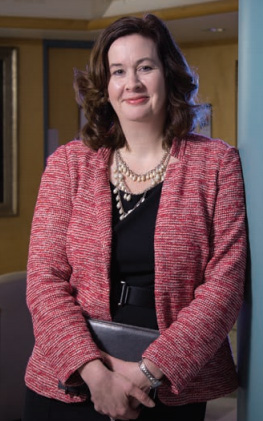Q&A: Valerie Weber, MD, Vice Dean for Educational Affairs
Valerie Weber, MD, MS, FACP, joined the College of Medicine in October 2014 after serving as a member of the senior leadership team that founded The Commonwealth Medical College in Scranton, Pa., in 2009. Her previous experience as division chief of general internal medicine and geriatrics at Geisinger Health System and as clinical associate professor at several medical schools added to the breadth of experience she brings to her new role at Drexel Valerie University College of Medicine.

What attracted you to Drexel University College of Medicine?
I was fascinated by the school's story and how quickly the Drexel brand took hold. When you go to national medical education meetings, everybody knows who Drexel is. The College is well known for its women's leadership program ELAM — and for forward thinking in the use of technology in medical education. Being part of Drexel University affords us some unique opportunities to continue to be leaders in medical education, and I wanted to be part of that.
What initiatives do you have planned?
We are embarking on a curricular renewal process. There is nothing wrong with what we're doing currently. It's just that the world our graduates face has totally changed over the past 15 years, since the last major curricular review was conducted. Our graduates now need to understand health informatics, quality and patient safety, and more about the business of medicine. They also need to know how to work on an interdisciplinary team and how to be leaders in many different areas. Having the opportunity to partner with other Drexel schools and colleges will give us a great advantage in developing innovative programs. Drexel University's strengths in engineering, informatics, public health and other areas afford us opportunities that no other medical school has.
How will the curriculum renewal process work?
In December 2014, we launched a curriculum renewal website that can be accessed by everyone in the College of Medicine community. We've posted the values of the process: to include all stakeholders in the College, to be transparent, and to ensure that every voice is heard. People can comment through a blog on the website. The more people we hear from, the better.
In January, we held a retreat attended by 59 people, including eight students. Every person we invited came. We discussed what we want our graduates to look like. What things are unique to the College? What strengths can we enhance to build an even stronger program? Now a steering committee of 12 people is writing a high-level framework for the curriculum with input from the retreat. The class entering in 2017 will be the first class to have this new curriculum. Since that class graduates in 2021, we're calling this "Curriculum 21."
Before the retreat, we surveyed faculty members and some key alumni. The number one theme that surfaced is that we produce excellent, caring physicians. Other strengths that were identified include our history of women in medicine, our dearly held principles of diversity and inclusion, and our service and community mission. Our focus on urban health and women's health can help to differentiate us. Others commented on our commitment to education technology and simulation. We have a proud tradition, and we have a strong curriculum now. But, to paraphrase A.J. Drexel, "We must change as the world changes or we'll be left behind."
Please explain the longitudinal patient care experience you would like to include.
Most medical students train through clinical clerkships that are mainly hospital based. Some medical schools offer programs in which students spend a year intermingling all six core disciplines; they stay with preceptors, mostly in ambulatory settings, the whole year. Instead of rotating through hospital wards, they follow the preceptors' patients in the office or the hospital. This model produces more empathetic physicians because they are following specific patients rather than rotating through wards where they see patients for a few days and then never see them again. We would like all students at Drexel to have this type of longitudinal patient care experience.
Is there another goal you would highlight?
We want to teach students to be self-directed learners. Many medical schools have prerecorded lectures that students view independently. When they come to class, there is interaction, small-group learning, and patient-centered cases to learn from. They learn how to assess their knowledge and knowledge gaps in real time. Physicians who are lifelong learners are much better able to succeed throughout their careers.
Back to Top